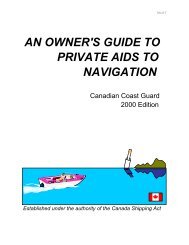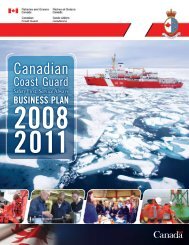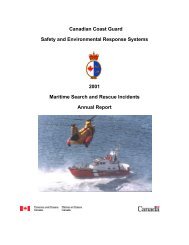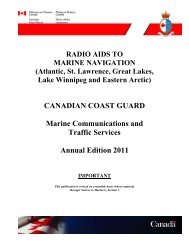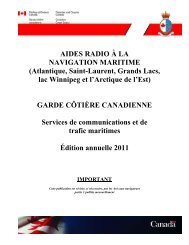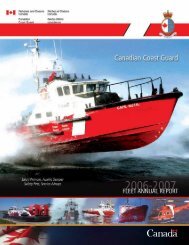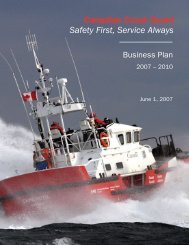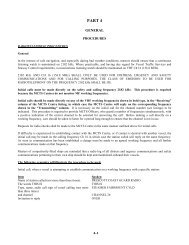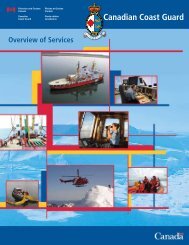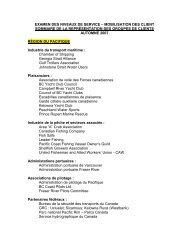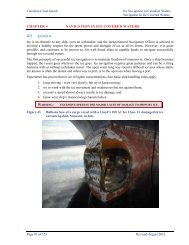Business Plan - Canadian Coast Guard
Business Plan - Canadian Coast Guard
Business Plan - Canadian Coast Guard
You also want an ePaper? Increase the reach of your titles
YUMPU automatically turns print PDFs into web optimized ePapers that Google loves.
(5)FINANCIAL INFORMATION60Status of Financial Management Initiativesin the <strong>Coast</strong> <strong>Guard</strong>In recent years, the <strong>Coast</strong> <strong>Guard</strong> has implemented anumber of initiatives to improve financial planning,reporting and monitoring. The new financialmanagement initiatives include:• The implementation of Activity-based Managementand Activity-based Budgeting which improves thelink between our allocation decisions and TreasuryBoard’s Management, Resources and ResultsStructure (MRRS);• Revisions to our Program Activity Architecture thatallows us to clearly quantify the cost of providingan operationally ready Vessel Fleet for Canada;• More timely and proactive planning cycle whichaffords managers the ability to begin the yearwith a finalized budget allocation, thus improvingtransparency and accountability for results;• Improving our Capital management process in orderto better integrate our operational requirements withour capital investments.Operating EnvironmentLike all organizations, the <strong>Coast</strong> <strong>Guard</strong> has had toadjust to overall economic trends and government-widedecisions. The most significant have been:• The need, over the past 2-3 years, to reallocateapproximately $11M internally to cover increasedfuel costs. Indeed, last year fuel prices were so highthat the <strong>Coast</strong> <strong>Guard</strong> had to secure $25M fromthe Treasury Board over and above its fuel budget,including the internal reallocation, to cover costs.However, given current fuel forecasts, it is expectedthat CCG will be able to manage within its base fuelbudget for 2009-2010. The volatility of fuel pricesremains a significant risk.• For 2009-2010, there has been a modest decrease inthe <strong>Coast</strong> <strong>Guard</strong> operating budget of approximately$1M. This is a continuation of governmentwidebudgetary reductions which stem from theExpenditure Review exercise outlined in Budget2005. Individual federal departments were taskedto reduce expenditure as a result of improvements inoperations and a rigorous assessment of the relevanceand effectiveness of programs.• The recent economic downturn has reducedcommodity and labour costs that have taken somepressure off capital and vessel refit budgets.• As the economy slows, it is widely expected thatshipping in Canada will also diminish. This willnegatively impact the amount of revenue we collectfor our ice-breaking and maritime navigationservices. Despite the falling revenue, we will still berequired to maintain our advertised levels of serviceto <strong>Canadian</strong>s. As a result, the decreased revenue willnegatively impact our operating budget.<strong>Coast</strong> <strong>Guard</strong> has been able to manage these adjustmentswithout any noticeable reductions in advertised levels ofservice. As part of Federal Budget 2009, the Governmentintroduced government-wide restraint measures fordiscretionary spending areas such as: travel, hospitality,conferences, and professional services. <strong>Coast</strong> <strong>Guard</strong> hadpreviously adopted many of these measures as part of itsbudget planning to deal with some of the developmentsnoted above.Assets and LiabilitiesWith 11,500 assets worth $11.6 billion, CCG is aheavily asset-reliant and capital-intensive Agency whichrelies on a vast infrastructure to deliver on its programmandate. The overall asset base includes such assets as:• Small, medium, and large aids to navigation;• Communication systems and equipment;• Helicopters;• Vessels; and• Waterways.The replacement value of CCG’s assets has increasedfrom the previously reported amount of $5.6 billion in2007-2008 to $11.6 billion in 2008-2009. The primarycause for this increase is due to a marked escalationin the replacement cost of new vessels. The realities oftoday’s shipbuilding costs were incorporated into pricinganalysis undertaken as part of the Fleet Renewal <strong>Plan</strong>which has extensively measured the cost to replace eachof the essential fleet vessels. Also, as the Polar Icebreakeris expected to cost in the neighbourhood of $800M fora single unit, an $11.6 billion replacement of the entirefleet is likely a more substantive estimate than that whichpreviously reported.<strong>Canadian</strong> <strong>Coast</strong> <strong>Guard</strong> — www.ccg-gcc.gc.ca



